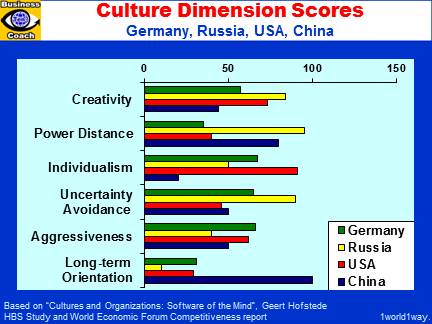Business culture in Germany is formal and hierarchical, while the USA promotes a more informal and egalitarian work environment. German business practices emphasize punctuality and planning, contrasting with the American preference for flexibility and innovation.
Understanding the nuances of business culture in Germany versus the USA is crucial for successful international collaborations. German professionals uphold a strong sense of formality, with titles and surnames used in business interactions, and meetings that stick to a structured agenda.
Decision-making tends to follow a top-down approach, reflecting the value placed on hierarchy and clear roles within organizations. On the other hand, American business culture is characterized by a more casual approach to communication, often using first names from the outset. Meetings might be less rigidly structured, and brainstorming or open discussions are common, highlighting the American emphasis on creativity and adaptability. The contrast between the meticulous, rule-oriented German style and the dynamic, results-driven American approach can present challenges, but also opportunities for synergy when navigating international business waters.

Credit: www.brandsjet.ai
Introduction To Business Culture In Germany And The Usa
Exploring business culture in Germany and the USA reveals distinct approaches and practices. This comparison offers valuable insights for professionals engaged in international business.
Initial Insights
Business culture in both Germany and the USA shapes how companies operate daily. Understanding these cultures can lead to successful international collaborations.
- Germany values structure, precision, and planning.
- The USA emphasizes flexibility, innovation, and speed.
Cultural Significance In Business
Cultural norms influence business interactions significantly in both countries. Recognizing these can prevent misunderstandings and foster smoother exchanges.
| Aspect | Germany | USA |
|---|---|---|
| Communication Style | Direct, Formal | Informal, Friendly |
| Decision Making | Consensus-based | Top-down |
| Meeting Etiquette | Punctual, Structured | Flexible, Dynamic |
In Germany, timeliness reflects respect and efficiency. In the USA, adaptability is often seen as a key to innovation.

Credit: www.linkedin.com
Hierarchy And Authority
Understanding the differences in business culture can be a game-changer when working internationally. The way businesses operate can vary greatly from country to country, especially when it comes to hierarchy and authority. Let’s delve into the nuances of German and American business cultures under this lens.
German Formality And Structure
In Germany, business culture places a strong emphasis on formality and structure. Titles are important and used often. Communication tends to be formal, even after years of working together. Decision-making follows a clear hierarchy. Workers expect instructions from above and seldom challenge their superiors. This structure aims to maintain order and efficiency.
- Clear hierarchy in organizations
- Use of formal titles and surnames
- Respect for authority is paramount
- Structured decision-making processes
American Egalitarian Approach
The USA takes a more relaxed stance on hierarchy and authority. Americans value an egalitarian approach. Employees at all levels are encouraged to contribute ideas. Managers often adopt a first-name basis. This informality aims to foster innovation and collaboration. Decisions can be made more quickly due to the flexible structure.
- Flat organizational structures are common
- Informal communication, including a first-name basis
- Encouragement of input from all levels
- Quick decision-making and adaptability
Communication Styles
Understanding how businesses communicate can shape your success. Different cultures have unique styles. In this section, we dive into how Germany and the USA differ in their communication approaches.
Directness In German Interactions
German business culture values clarity and precision. German professionals are known for their straightforwardness. They get to the point quickly. This directness shows up in meetings, emails, and negotiations. It’s not about being rude; it’s about efficiency. Here are key points about German communication:
- Clear expectations set the stage for effective dialogue.
- Feedback is often blunt and constructive.
- Small talk is minimal; focus is on task at hand.
American Indirectness And Diplomacy
In contrast, American business culture often leans towards indirectness. Diplomacy plays a big role. Americans tend to use softer language. They aim to avoid conflict and maintain relationships. Here’s what to expect in American communication:
- Messages are often polite and considerate.
- Feedback may be sugar-coated to soften the blow.
- Building rapport is important, with more emphasis on small talk.
In summary, Germans value directness while Americans prioritize diplomacy. Recognizing these styles can help you navigate international business waters with ease.
Attitudes Toward Punctuality
Attitudes Toward Punctuality reflect deep cultural values. They influence business meetings, project deadlines, and daily work life. Germany and the USA present contrasting punctuality norms. Understanding these can lead to better international collaboration.
German Precision In Time Management
In Germany, time is a resource that people manage with care. Punctuality is a sign of respect. Germans often arrive early to appointments. Being late can hurt one’s reputation.
- Meetings start exactly on time.
- Deadlines are serious commitments.
- Time planning is detailed and followed strictly.
Project timelines are realistic but firm. German businesses expect everyone to honor these time commitments.
Flexibility In American Scheduling
Meanwhile, in the USA, there’s a more relaxed approach to time. Americans value punctuality but offer more flexibility. It’s common to see scheduling changes.
- Meetings may start a few minutes late.
- Deadlines can be negotiable.
- Last-minute adjustments are often accommodated.
This flexibility supports creativity and adaptability. American businesses value the ability to respond to unexpected opportunities.
Approach To Meetings And Negotiations
The business world hinges on how effectively people can come together to agree on common goals. This is evident in the approach to meetings and negotiations. Germany and the USA, two powerhouses in the global market, approach these differently. Let’s dive into how these cultural giants handle the art of meeting and negotiation.
German Thoroughness And Preparation
German business culture values meticulous preparation. Before any meeting, Germans invest time in comprehensive research. They expect all participants to arrive with a deep understanding of the topics discussed. Bullet points and facts are crucial. The agenda is followed strictly with little deviation. This preparation leads to detailed discussions and a focus on quality outcomes.
- Agendas are distributed early, providing ample prep time.
- Meetings start on time and stick to a precise schedule.
- Direct communication is valued over small talk.
- Documentation is expected, often in the form of reports or charts.
American Emphasis On Rapport
In contrast, American business culture often puts a spotlight on relationship-building. Meetings may start with informal banter, as participants seek to establish a connection. The American approach is flexible and can sometimes stray from the agenda to explore new ideas. Quick decision-making and a focus on the “big picture” often drive the conversation.
- Small talk is common to foster a friendly atmosphere.
- The agenda serves as a guideline, not a rulebook.
- Brainstorming and creativity are encouraged.
- Decisions can be made with a high-level overview, detailed analysis may follow.
Work-life Balance And Vacation
Understanding Work-Life Balance and Vacation is key to comparing business cultures. Both Germany and the USA have unique perspectives. Let’s explore these differences.
German Value On Leisure Time
Germans treasure their downtime. They work hard but also relax well. Germany’s labor laws reflect this balance. Employees enjoy ample vacation days. Full-timers often receive six weeks off annually. This time is for rest, travel, and family. Many companies shut down for a few weeks in the summer. It’s known as Betriebsferien or company holidays. Even outside vacation, work rarely spills into personal time. Emails after hours are not the norm.
American Work-centric Lifestyle
In the USA, work often takes center stage. The American dream praises long hours as the path to success. Unlike in Germany, US workers average two weeks of vacation. Some may not use all their vacation days. The culture doesn’t always encourage long breaks. Americans may work evenings or weekends. It’s common to check emails or take calls outside office hours. This approach aims for higher productivity and career growth.
| Aspect | Germany | USA |
|---|---|---|
| Vacation Days | Up to 6 weeks | About 2 weeks |
| After-Hours Work | Rare | Common |
| Cultural Norm | Work-Life Separation | Work-Life Integration |
- Germany: Enjoys a more balanced approach.
- USA: Values a work-centric lifestyle.
- Review vacation policies before accepting a job.
- Consider how work culture impacts personal life.
- Understand cultural norms to blend in better.
Both cultures offer unique benefits. Choose what aligns with personal values and lifestyle preferences.
Risk-taking And Innovation
Risk-taking and innovation stand as pivotal factors shaping the business culture in any country. They drive growth, create new opportunities, and can dictate the global competitiveness of a nation. Germany and the USA present two distinct approaches to these elements within their business environments.
German Caution And Reliability
Germany’s business culture leans heavily on caution and thorough planning. Known for their meticulous approach to business, German companies focus on sustainable growth and long-term success. Risk is often carefully analyzed, with a preference for reliable outcomes over uncertain ventures.
- Extensive Research: Before taking action, Germans conduct deep analysis.
- Quality Assurance: Products and services must meet high standards.
- Structured Processes: Emphasis on detailed and systematic procedures.
American Entrepreneurial Spirit
In contrast, American business culture thrives on the entrepreneurial spirit. The US market is known for its embrace of risk and encouragement of innovation. This often leads to a dynamic, fast-paced business environment where agility and adaptability are key.
| Characteristic | Description |
|---|---|
| Quick Decision-Making | US businesses often make swift decisions to capitalize on opportunities. |
| Failure Tolerance | Failure is seen as a learning experience, not a setback. |
| Innovation Focus | Constant pursuit of groundbreaking ideas and technologies. |

Credit: www.1world1way.com
The Role Of Laws And Regulations
The Role of Laws and Regulations plays a pivotal part in shaping business culture. In Germany and the USA, these roles differ significantly. They influence how companies operate on a daily basis. Understanding these differences can help businesses navigate legal landscapes in both countries.
German Regulatory Framework
Germany is known for its strong regulatory environment. This framework ensures high standards in product quality, safety, and environmental protection. German laws often require detailed documentation and adherence to strict procedures.
- Bureaucracy: Complex administrative procedures are common.
- Worker Participation: Laws mandate employee involvement in decision-making.
- Environmental Regulations: Strict rules govern ecological impacts.
Businesses in Germany must navigate these regulations carefully. They need to maintain compliance and avoid penalties.
American Flexibility And Deregulation
The USA takes a more relaxed approach to business regulations. It emphasizes flexibility and innovation. The American market often sees quicker adaptations to change due to less stringent laws.
- Less Red Tape: Easier startup and operational procedures.
- Market-Driven Policies: Regulations adjust to economic needs.
- Competitive Edge: Businesses can pivot and innovate rapidly.
While this flexibility can fuel growth, it also requires companies to be proactive. They must stay informed about current laws and best practices.
Building Relationships And Networking
In the world of business, relationships and networking are key. They open doors, create opportunities, and often set the tone for future partnerships. Germany and the USA present distinct approaches to professional interactions.
Formal German Business Relationships
German business culture values structure and formality. First impressions matter, and so does respect. Here’s how Germany approaches business relationships:
- Title and Surname: Use formal titles and last names when addressing others.
- Meetings: Schedule them in advance and be punctual.
- Business Cards: Exchange them during initial meetings.
- Small Talk: Keep it minimal and focus on business topics.
- Dress Code: Dress conservatively and professionally.
Building trust takes time. Germans prefer to know their business partners before making deals.
Casual American Networking Culture
Americans take a more relaxed approach to networking. The focus is on openness and making connections quickly.
- First Names: Use first names often, even in professional settings.
- Small Talk: It’s common and helps break the ice.
- Meetings: They can be informal and sometimes last-minute.
- Follow-Ups: Quick follow-ups are seen as enthusiastic and proactive.
- Attire: Business casual is widely accepted, depending on the industry.
Connections can form quickly, and networking events are frequent. Americans value a “time is money” mindset.
Conclusion: Embracing Cultural Synergies
Business culture in Germany and the USA varies significantly. Understanding these differences is key to global success. Both nations offer unique strengths in the business world. By embracing these differences, companies can foster innovation and growth.
Leveraging Differences
German business culture often focuses on structure and precision. On the other hand, American culture values flexibility and innovation. These contrasting approaches can complement each other. German thoroughness paired with American creativity could lead to groundbreaking solutions.
- German precision enhances American innovation.
- American flexibility can speed up German processes.
Future Of Transatlantic Business Relations
The collaboration between German and American companies is promising. It could redefine global business standards. Embracing cultural synergies will likely drive success in future transatlantic projects.
- Collaboration leads to innovative solutions.
- Synergies drive global business success.
This positive trend suggests a bright future for businesses that adapt to and respect cultural differences.
Frequently Asked Questions
What Is Germany’s Business Culture?
Germany’s business culture emphasizes punctuality, precision, and formality. Hierarchical structures prevail in workplaces, with clear roles and respect for authority. Meetings are thorough and well-prepared, focusing on direct communication and factual discussions. Building trust is crucial for long-term business relationships.
What Are Some Differences Between Germany And The United States?
Germany operates under a parliamentary system, while the U. S. has a presidential system. Germans enjoy universal healthcare; Americans have mixed healthcare coverage. Germany is geographically smaller but denser in population compared to the vast U. S. The official language in Germany is German, whereas the U.
S. has no official language.
What Is The Work Culture In Germany?
The work culture in Germany emphasizes punctuality, efficiency, and precision. Hierarchical structures are common, with clear responsibilities. There’s a strong focus on work-life balance, with legal protections for leisure time and holidays.
Is Business Culture In Europe Is Much Different Than That Of The Us?
Business culture in Europe often places more emphasis on work-life balance and hierarchy than the US, where the work environment tends to be more casual and results-driven.
Conclusion
Navigating the nuances between German and American business cultures is crucial for international success. By understanding these differences, companies can foster better partnerships and enhance global operations. Embrace cultural diversity, and watch your business thrive across borders. Ready to bridge the gap?
Your next successful venture awaits.
 Sotto TV Sotto TV বাংলাদেশের একটি জনপ্রিয় ওয়েব পোর্টাল। যেখানে টেকনোলজি,বিভিন্ন ধরনের টিপস,ক্যারিয়ার টিপস,ব্যাংকিং ইনফর্মেশন, অনলাইনে আয় করার পদ্ধতি এবং সাম্প্রতিক সময়ে ঘটে যাওয়া সকল আপডেট তথ্য প্রকাশ করা হয়।
Sotto TV Sotto TV বাংলাদেশের একটি জনপ্রিয় ওয়েব পোর্টাল। যেখানে টেকনোলজি,বিভিন্ন ধরনের টিপস,ক্যারিয়ার টিপস,ব্যাংকিং ইনফর্মেশন, অনলাইনে আয় করার পদ্ধতি এবং সাম্প্রতিক সময়ে ঘটে যাওয়া সকল আপডেট তথ্য প্রকাশ করা হয়।



